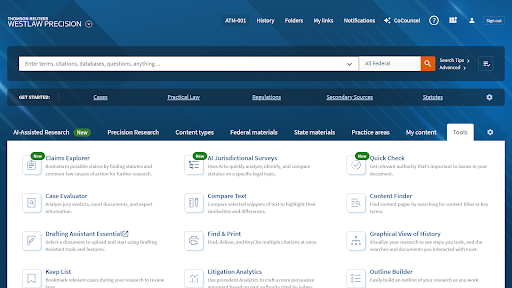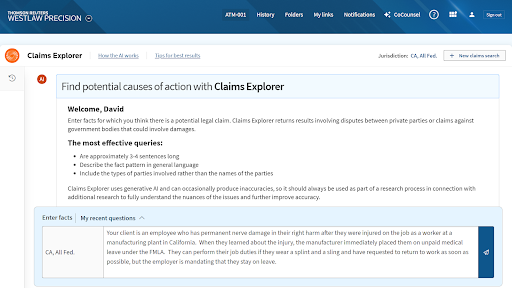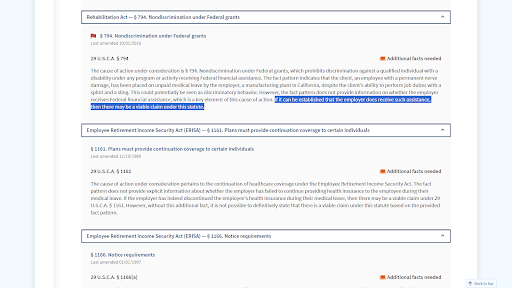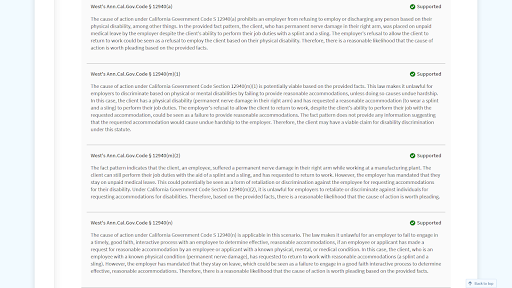Attorneys
are
acutely
aware
of
the
potential
pitfalls
associated
with
overlooking
claims.
For
plaintiffs’
attorneys,
missing
a
claim
could
mean
unclaimed
compensation,
while
for
defense
counsel,
it
might
result
in
unforeseen
liabilities.
Identifying
claims
is
not
only
important
for
litigators
though.
In-house
counsel
and
government
lawyers
must
also
meticulously
assess
potential
claims
to
strategize
effectively,
and
transactional
lawyers
need
to
consider
potential
litigation
risks
during
negotiations.
Thorough
claims
identification
has
to
go
beyond
brainstorming.
It
requires
a
nuanced
understanding
of
legal
precedent,
statutes,
and
potential
arguments.
Despite
best
efforts,
however,
the
process
of
identifying
claims
often
resembles
an
exercise
in
speculation,
as
evidenced
by
the
frequency
with
which
complaints
are
amended,
even
by
sophisticated
practitioners.
Enter
Thomson
Reuters’
Claims
Explorer,
an
innovative
tool
integrated
into
Westlaw
Precision
with
CoCounsel
and
designed
to
address
the
challenge
of
unrecognized
claims
using
generative
AI.
With
Claims
Explorer,
attorneys
can
input
a
fact
pattern
and
receive
a
comprehensive
list
of
potential
statutory,
common
law,
and
constitutional
claims,
complete
with
granular
insights
down
to
the
subsection
level.
To
do
this,
Claims
Explorer
leverages
the
expertise
of
Thomson
Reuters’
extensive
and
expert
team
of
attorney
editors,
who
create
dedicated
editorial
content
which
augments
and
fuels
the
generative
power
of
a
large
language
model.
Product
testing
has
shown
transformative
results
across
a
range
of
legal
practitioners.

Operational
Overview
Accessing
Claims
Explorer
is
straightforward.
A
single
click
within
Westlaw
Precision
with
CoCounsel
brings
up
a
user-friendly
interface
where
researchers
are
prompted
to
enter
a
concise
fact
pattern
—
typically
three
to
four
sentences
suffice.
For
instance,
consider
a
scenario
involving
a
California
worker
placed
on
unpaid
leave
after
an
on-the-job
injury
despite
being
capable
of
performing
required
duties.

Within
moments,
Claims
Explorer
generates
a
list
of
potential
federal
and
state
statutory,
common
law,
and
constitutional
claims.

Results
are
categorized
as
either
“supported”
or
“additional
facts
needed,”
with
the
latter
accompanied
by
detailed
analyses
indicating
a
potential
claim
and
identifying
information
missing
from
the
prompt
which
would
support
that
claim.
For
example,
in
the
worker
scenario,
a
potential
claim
might
require
the
employer
to
receive
federal
financial
assistance,
and
the
tool
explicitly
notes
this
prerequisite.

This
feature
serves
as
an
invaluable
starting
point
for
further
inquiry,
facilitating
discovery
requests
or
prompting
additional
client
questions.
It
ensures
that
attorneys
comprehensively
explore
all
potential
avenues
of
liability,
enhancing
their
ability
to
identify
unknown
risks.
Enhanced
Analytical
Precision
Claims
Explorer
provides
detailed
insights
into
each
claim,
including
specific
legal
subsections.
For
instance,
in
the
California
state
law
context
of
the
worker
scenario,
attorneys
receive
not
only
the
relevant
statutory
section
but
also
the
specific
subsection,
along
with
a
detailed
analysis
of
its
applicability.

This
level
of
detail,
previously
attainable
only
through
extensive
research,
is
now
accessible
within
seconds
thanks
to
the
generative
AI
capabilities
of
Claims
Explorer.
The
precision
of
the
tool
is
attributed
to
the
training
provided
by
Thomson
Reuters’
highly
experienced
expert
attorney
editors.
Efficacy
and
Impact
Thomson
Reuters’
testing
of
Claims
Explorer
reveals
impressive
efficacy.
In
an
analysis
of
cases
where
sophisticated
Am
Law
firms
amended
complaints
to
add
claims,
Claims
Explorer
identified
the
missing
claims
94%
of
the
time
when
provided
with
only
the
facts
from
the
original
complaint.
And
in
a
comparative
study,
lawyers
using
Claims
Explorer
identified
three
times
as
many
potentially
viable
claims
in
half
the
time
compared
with
those
working
without
the
tool.
Implications
for
Legal
Practice
The
introduction
of
Claims
Explorer
has
significant
implications
for
various
aspects
of
legal
practice:
-
Litigation
Preparation:
Enhances
the
thoroughness
of
initial
case
assessments
and
complaint
drafting. -
Risk
Management:
Assists
defense
counsel
in
anticipating
potential
claims,
identifying
counterclaims,
and
developing
comprehensive
strategies. -
Transactional
Due
Diligence:
Provides
transactional
attorneys
with
insights
into
potential
litigation
risks. -
In-House
and
Government
Counsel:
Facilitates
more
comprehensive
legal
risk
assessments.
While
Claims
Explorer
represents
a
powerful
addition
to
the
legal
professional’s
toolkit,
it
is
important
to
note
that
it
serves
as
an
aid
to,
rather
than
a
replacement
for,
skilled
legal
analysis.
The
tool’s
efficacy
in
identifying
potential
claims
should
of
course
be
balanced
with
the
practitioner’s
experience
and
expertise
in
evaluating
the
merits
and
strategic
value
of
pursuing
claims.
In
conclusion,
Claims
Explorer
represents
a
significant
advancement
in
legal
technology
—
an
effective
tool
where
previously
there
was
none
—
equipping
attorneys
with
powerful
functionality
to
mitigate
the
risk
of
missed
claims
and
enhance
their
strategic
decision-making
processes.
Find
out
more
about
Claims
Explorer
on
Westlaw
Precision
with
CoCounsel
here.

